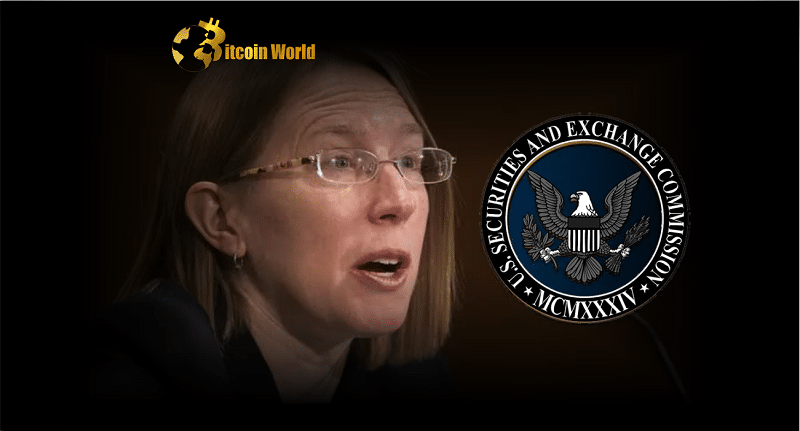Is the future of Decentralized Finance (DeFi) at a crossroads? A prominent voice within the Securities and Exchange Commission (SEC), Commissioner Hester Peirce, is raising serious alarms about the agency’s approach to regulating the burgeoning DeFi space. She’s directly challenging Chair Gary Gensler’s agenda, arguing that it could stifle innovation and push crypto further away from US shores. Let’s dive into the heart of this regulatory clash and understand what’s at stake for the future of DeFi.
What’s Got Hester Peirce Concerned?
At the core of Peirce’s dissent is the SEC’s proposal to broaden the definition of “exchange.” Sounds technical, right? But this seemingly small change could have massive repercussions for DeFi. The SEC aims to bring decentralized finance technologies under its regulatory umbrella by redefining what constitutes an “exchange.” Peirce argues this move is not just misguided, but actively harmful.
In a recent lecture, Peirce didn’t mince words. She believes this regulatory overreach is a recipe for disaster, predicting dire consequences for the crypto ecosystem. She sums up her concerns with four powerful words:
- Stagnation: Innovation grinds to a halt.
- Centralization: DeFi, meant to be decentralized, is forced back into traditional, centralized models.
- Expatriation: Crypto projects and talent flee the US for more welcoming regulatory environments.
- Extinction: The promise of novel financial technologies is extinguished before it can fully bloom.
These aren’t just buzzwords; they represent a fundamental disagreement about how to foster innovation while protecting investors. Peirce believes the SEC’s current path is doing the opposite.
“Ambiguity” and the First Amendment: Are Free Speech Rights at Risk?
Peirce’s critique goes beyond just economic concerns. She raises a crucial point about free speech. The SEC’s proposal, according to Peirce, is so vaguely worded that it could inadvertently infringe on First Amendment rights.
How so? The proposal broadly categorizes everyone within a blockchain ecosystem as a “group.” Peirce argues this sweeping classification creates immense uncertainty about what kind of communication within these ecosystems would require government pre-approval. This ambiguity, she warns, could have a chilling effect on constitutionally protected speech.
Think about it: if developers, users, and even casual observers within a DeFi network are considered a “group” subject to undefined communication regulations, it creates a climate of fear and self-censorship. This is a significant concern for a technology built on open source principles and community participation.
A Regulatory “Failure” and a Lesson from the Past
Peirce doesn’t just criticize; she also offers a historical perspective and a potential way forward. She points out that the SEC has a history of regulatory “failure” when it comes to new technologies. Instead of repeating past mistakes, she urges the agency to learn from them.
Drawing a parallel to the 1990s, Peirce highlights a time when the SEC demonstrated a willingness to adapt its rules to accommodate innovation in securities trading. She argues that the SEC of the 90s understood a crucial principle: regulations should evolve to support new technologies, not stifle them.
Here’s the core of her argument:
Then (1990s SEC):
- Recognized the need to tweak rules for innovation.
- Made room for improvements in securities trading.
- Focused on adapting regulations to new business models.
Now (Current SEC Proposal):
- Believes existing regulations are rigid and absolute.
- Excludes business models that don’t fit pre-existing standards.
- Risks destroying innovative markets instead of regulating them effectively.
Peirce emphasizes that a regulatory body serious about fostering a healthy market should be open to adapting its framework. She believes the current approach signals a departure from this principle, potentially shutting out cutting-edge enterprises simply because they don’t neatly fit into old regulatory boxes.
Regulation vs. Destruction: Finding the Right Balance for DeFi
Commissioner Peirce’s dissent is a powerful call for a more nuanced and innovation-friendly approach to DeFi regulation. She’s not advocating for a complete lack of oversight. Instead, she’s arguing for a smarter, more adaptable regulatory framework that encourages growth and innovation while addressing legitimate risks.
The question isn’t whether to regulate DeFi, but how to regulate it effectively without inadvertently crushing its potential. Peirce’s critique highlights the dangers of a rigid, one-size-fits-all approach and underscores the need for regulators to engage with the nuances of decentralized technologies.
As the debate around DeFi regulation intensifies, Peirce’s voice serves as a crucial reminder: regulation should be a tool for fostering healthy markets, not a weapon of stagnation and extinction. The future of DeFi, and potentially the US’s leadership in the blockchain space, may well depend on finding this delicate balance.
Disclaimer: The information provided is not trading advice, Bitcoinworld.co.in holds no liability for any investments made based on the information provided on this page. We strongly recommend independent research and/or consultation with a qualified professional before making any investment decisions.


